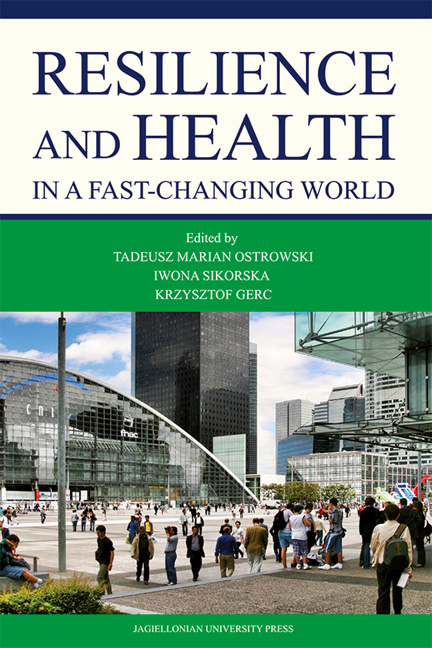Book contents
- Frontmatter
- Table of Contents
- Resilience from a Variety of Theoretical Perspectives: an Introduction
- I RESILIENCE IN THE PHILOSOPHICAL AND THE EXISTENTIAL CONTEXTS
- II SOCIAL CONTEXTS OF RESILIENCE
- III PROMOTING OF RESILIENCE AND ASSISTED RESILIENCE
- Improving the Socio-Emotional Health of Young People in Early Secondary Education: Preliminary Findings from a Study of the Pyramid Intervention Project
- Brave Children: How to Develop Resilience in Childhood
- Using Music to Stress Reduction
- Mental Health in Acceptance and Commitment Therapy (ACT)
- The Crisis of Adolescence in the Context of Resilience – Positive Prevention
- IV THREATS TO MENTAL HEALTH
- List of Authors
The Crisis of Adolescence in the Context of Resilience – Positive Prevention
from III - PROMOTING OF RESILIENCE AND ASSISTED RESILIENCE
Published online by Cambridge University Press: 12 January 2018
- Frontmatter
- Table of Contents
- Resilience from a Variety of Theoretical Perspectives: an Introduction
- I RESILIENCE IN THE PHILOSOPHICAL AND THE EXISTENTIAL CONTEXTS
- II SOCIAL CONTEXTS OF RESILIENCE
- III PROMOTING OF RESILIENCE AND ASSISTED RESILIENCE
- Improving the Socio-Emotional Health of Young People in Early Secondary Education: Preliminary Findings from a Study of the Pyramid Intervention Project
- Brave Children: How to Develop Resilience in Childhood
- Using Music to Stress Reduction
- Mental Health in Acceptance and Commitment Therapy (ACT)
- The Crisis of Adolescence in the Context of Resilience – Positive Prevention
- IV THREATS TO MENTAL HEALTH
- List of Authors
Summary
Abstract
This article presents a curious outlook on the phenomenon of identity crisis among young people from the perspective of positive psychology and pedagogy. The subject is significant for the reason that it illustrates the methods of coping with identity crisis which untreated may lead to serious consequences for the individual and their environment. The positive psychology approach can bring a new point of view for social rehabilitation and the preventive measures.
The previous preventative and rehabilitative solutions did not produce any expected results; consequently, rehabilitation remains a utopia. Therefore, it is necessary to investigate new, accurate approaches and forms of interaction. It is hoped that positive psychology which within the last three decades has provided an alternative for the traditional approach focusing on human defects is the answer.
The current achievements of positive psychology appear promising for better diagnosis, understanding and developing the theory of personality disorders, substance abuse, and conflicts. Knowing and focusing on the positive resources of an individual allows to create a theoretical basis enabling a positive prevention.
The state of the art of positive psychology may contribute to the initiation and possibly a shift in perceiving rehabilitation of youth and its outcome, and strengthening faith in people. What is essential is the idea of the transformation of thinking, which can be instilled in a new generation of socially maladjusted youth mentors for it is impossible to rehabilitate effectively without a conviction that actions bring meaning.
Key word: a critical transition, adolescence, young people maladjusted, positive prevention
Introduction
Adolescence is a specific stage in life of every human being when young people commence to look for their own identity and try to answer the question: “who am I?,” and a time of intense biological, psychological and sociological changes. The way of dealing with identity crisis depends on many factors, including the resources of resistant youth. The inability to cope with the crisis may result in dangerous activities (e.g. self-destructive behavior), or socially maladjusted behavior.
Socially maladjusted young people and volunteers represent different ways of coping with the crisis of adolescence. The first category manifests rebellion against the recognized principles, and tries to find its own identity in the group, which confirms their antisocial beliefs. The second one, by engaging in pro-social activities and helping others, realizes themselves and meets the need to feel wanted.
- Type
- Chapter
- Information
- Resilience and Health in a Fast-changing World , pp. 167 - 178Publisher: Jagiellonian University PressPrint publication year: 2015



